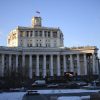 The Governor of the Bank of England says he cannot say with certainty that interest rates have peaked. Photo: Holly Adams/Bloomberg < p>The Bank of England signaled it may not be done raising interest rates as Governor Andrew Bailey warned there was «still some way to go» in tackling UK inflation. Threadneedle Street said price rises in the UK were more stubborn than in other rich economies as the Bank's Monetary Policy Committee (MPC) voted 6-3 to keep borrowing costs at 5. 25%.
The Governor of the Bank of England says he cannot say with certainty that interest rates have peaked. Photo: Holly Adams/Bloomberg < p>The Bank of England signaled it may not be done raising interest rates as Governor Andrew Bailey warned there was «still some way to go» in tackling UK inflation. Threadneedle Street said price rises in the UK were more stubborn than in other rich economies as the Bank's Monetary Policy Committee (MPC) voted 6-3 to keep borrowing costs at 5. 25%.
<р>Mr Bailey said it was «too early to start speculating about interest rate cuts» as the MPC warned that «further tightening» would be necessary if price pressures persisted.
The hawkish comments are in direct contrast to US Federal Reserve Chairman Jerome Powell, who said on Wednesday that policymakers had begun discussing rate cuts.
This opens a gap between the world's two leading central banks after the Federal Reserve proposed three rate cuts next year.
After the Bank's announcement, the pound rose by more than a cent against the dollar to almost $1.28.
Christine Lagarde, president of the European Central Bank, said policymakers in the single currency bloc “did not discuss” rate cuts at their last meeting on Thursday.
< p>The ECB kept borrowing costs at a record high of 4% and announced plans to accelerate the reduction of its balance sheet.Ms Lagarde told reporters that the ECB “absolutely should not let its guard down” on inflation after the adoption solutions.
But in a clear sign that global interest rates have already peaked, the Swiss National Bank joined the Fed on Thursday in calling for an end to the cycle of rate hikes as inflation slows.
Mr Bailey sought to play down speculation in the market that the Bank would soon follow the Fed's lead and cut rates. Despite the pound's surge, investors have doubled their bets that UK rates will be cut to 4.25% next year.
Martin Weale, the Bank's former rate setter, warned that talk of Fed rate cuts would «have a gravitational pull» on other central banks that would be hard for Threadneedle Street to ignore.
However, Mr Bailey noted that the dynamics of inflation in the UK were very different from the situation in the US. The surge in energy prices following Russia's invasion of Ukraine has contributed much more to rising prices in the UK than in the US, which has a strong domestic energy industry.
Politicians pushed back against any suggestion of an imminent fall in the Bank's base rate, warning that wage and service inflation — two key indicators of price pressure — «remains elevated».
< p>The MPC said: “Inflation persists.” higher than in other major advanced economies, possibly reflecting less favorable supply dynamics and stronger second-round effects in the UK.»
UK inflation remains at 4.6% the highest among the G7 countries, and the UK is the only major economy where food price growth remains in double digits. Core inflation, which excludes food and energy costs, is also much higher in the UK than in the US or eurozone.
Mr Bailey said: «I don't think we can say with any certainty that interest rates have peaked.» . I am hopeful that we are at the top of the cycle and I am seeing encouraging signs in the inflation dynamics. But there are differences between our position and the US position. We have suffered very strong shocks that were more common in Europe.»
Even if interest rates do not need to be raised again, the Bank indicated that they would likely «need to be restrictive for a long period of time.» to help bring inflation back to the Bank's target of 2%.
The MPC noted bond yields in many advanced economies have fallen «significantly» over the past few weeks, prompting a number of large lenders to cut mortgage deals.
Mr Bailey added: “Markets obviously form their own view, that's what they do. I think the persistence of inflation remains a problem. We have seen an easing of many of the major shocks we experienced last year, particularly related to the war in Ukraine, but there is a persistent element to this that we must address.»
HSBC's Liz Martins said she expected a further slowdown in inflation.
She said: “The risks of inflation becoming entrenched have clearly eased in recent weeks. We now believe that the Bank will begin tapering in August 2024 [rather than] February 2025 – two months after we expect the US Federal Reserve to begin its first cut in June 2024.
“We then see about a 0.25 percentage point decline in the quarter, bringing the bank rate to 3.75% by the end of 2025.”
The minutes of the last MPC meeting also growth is forecast to remain flat until the end of this year as the UK narrowly avoids recession.
p>
The MPC said tax cuts announced in the Autumn Statement were likely to boost the economy by around a quarter of a percent over the next three years.
Responding to Mr Bailey, Chancellor Jeremy Hunt said: “The plan is working to bring down inflation, but we must not become complacent.”























































Свежие комментарии